Deck 5: Alkenes: Structure,nomenclature,and an Introduction to Reactivity - Thermodynamics and Kinetics
Question
Question
Question
Question
Question
Question
Question
Question
Question
Question
Question
Question
Question
Question
Question
Question
Question
Question
Question
Question
Question
Question
Question
Question
Question
Question
Question
Question
Question
Question
Question
Question
Question
Question
Question
Question
Question
Question
Question
Question
Question
Question
Question
Question
Question
Question
Question
Question
Question
Question
Question
Question
Question
Question
Question
Question
Question
Question
Question
Question
Question
Question
Question
Question
Question
Question
Question
Question
Question
Question
Question
Question
Question
Question
Question
Question
Question
Question
Question
Question

Unlock Deck
Sign up to unlock the cards in this deck!
Unlock Deck
Unlock Deck
1/84
Play
Full screen (f)
Deck 5: Alkenes: Structure,nomenclature,and an Introduction to Reactivity - Thermodynamics and Kinetics
1
Draw vinyl bromide.
CH2  CHBr
CHBr
 CHBr
CHBr 2
What is the IUPAC name for the following compound? 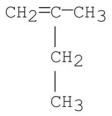
A)2-methyl-1-butene
B)isopentene
C)2-methybutene
D)2-ethylpropene
E)3-methyl-3-butene

A)2-methyl-1-butene
B)isopentene
C)2-methybutene
D)2-ethylpropene
E)3-methyl-3-butene
2-methyl-1-butene
3
Provide an acceptable name for the following compound. 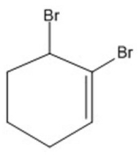

1,6-dibromocyclohexene
4
Provide an acceptable name for the following compound. 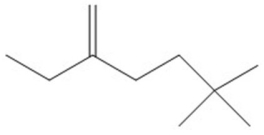


Unlock Deck
Unlock for access to all 84 flashcards in this deck.
Unlock Deck
k this deck
5
Name the structure. 
A)2-ethyl-1-pentene
B)2-propyl-1-butene
C)3-methylenehexane
D)3-methyl-3-hexene
E)ethyl propyl ethene

A)2-ethyl-1-pentene
B)2-propyl-1-butene
C)3-methylenehexane
D)3-methyl-3-hexene
E)ethyl propyl ethene

Unlock Deck
Unlock for access to all 84 flashcards in this deck.
Unlock Deck
k this deck
6
Name the structure. 
A)4-chlorocyclohexene
B)1-chloro-3-cyclohexene
C)1-chloro-3-cycloheptene
D)4-chlorocycloheptane
E)4-chlorocycloheptene

A)4-chlorocyclohexene
B)1-chloro-3-cyclohexene
C)1-chloro-3-cycloheptene
D)4-chlorocycloheptane
E)4-chlorocycloheptene

Unlock Deck
Unlock for access to all 84 flashcards in this deck.
Unlock Deck
k this deck
7
Give the possibilities in structure for a compound with a formula of C6H10.
A)no rings,no double bonds,no triple bonds
B)one double bond,or one ring
C)two rings,two double bonds,one double bond + one ring,or one triple bond
D)three rings,three double bonds,two double bonds + one ring,one ring + two double bonds,one triple bond + one ring,or one double bond + one ring
E)benzene
A)no rings,no double bonds,no triple bonds
B)one double bond,or one ring
C)two rings,two double bonds,one double bond + one ring,or one triple bond
D)three rings,three double bonds,two double bonds + one ring,one ring + two double bonds,one triple bond + one ring,or one double bond + one ring
E)benzene

Unlock Deck
Unlock for access to all 84 flashcards in this deck.
Unlock Deck
k this deck
8
Give the general formula for a cyclic alkene.
A)CnH2n-4
B)CnH2n-2
C)CnH2n
D)CnH2n+2
A)CnH2n-4
B)CnH2n-2
C)CnH2n
D)CnH2n+2

Unlock Deck
Unlock for access to all 84 flashcards in this deck.
Unlock Deck
k this deck
9
Give the degree of unsaturation for benzene.
A)1
B)2
C)3
D)4
E)5
A)1
B)2
C)3
D)4
E)5

Unlock Deck
Unlock for access to all 84 flashcards in this deck.
Unlock Deck
k this deck
10
Muscalure,the sex attractant of the common housefly,is an acyclic alkene that contains 23 carbons.How many hydrogen atoms are in a molecule of muscalure?

Unlock Deck
Unlock for access to all 84 flashcards in this deck.
Unlock Deck
k this deck
11
Which of the following is vinyl chloride?
A)CH3CH2Cl
B)CH2 CHCH2Cl
CHCH2Cl
C)CH2 CHCl
CHCl
D)
E)
A)CH3CH2Cl
B)CH2
 CHCH2Cl
CHCH2ClC)CH2
 CHCl
CHClD)

E)


Unlock Deck
Unlock for access to all 84 flashcards in this deck.
Unlock Deck
k this deck
12
Name the structure. 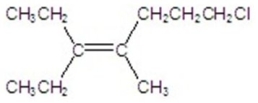
A)7-chloro-3-ethyl-4-methyl-3-heptene
B)1-chloro-5-ethyl-4-methyl-3-heptene
C)1-chloro-3-pentenyl-2-pentene
D)cis-7-chloro-3-ethyl-4-methyl-3-heptene
E)trans-7-chloro-3-ethyl-4-methyl-3-heptene

A)7-chloro-3-ethyl-4-methyl-3-heptene
B)1-chloro-5-ethyl-4-methyl-3-heptene
C)1-chloro-3-pentenyl-2-pentene
D)cis-7-chloro-3-ethyl-4-methyl-3-heptene
E)trans-7-chloro-3-ethyl-4-methyl-3-heptene

Unlock Deck
Unlock for access to all 84 flashcards in this deck.
Unlock Deck
k this deck
13
What is the common name for the following compound? 
A)t-butylene
B)sec-butylene
C)isobutylene
D)butylene
E)methylpropylene

A)t-butylene
B)sec-butylene
C)isobutylene
D)butylene
E)methylpropylene

Unlock Deck
Unlock for access to all 84 flashcards in this deck.
Unlock Deck
k this deck
14
β-Phellandrene is a hydrocarbon component of eucalyptus oil whose molecular formula is C10H16.A molecule of β-phellandrene contains 2 π-bonds.How many rings are in β-phellandrene?
A)0
B)1
C)2
D)3
E)4
A)0
B)1
C)2
D)3
E)4

Unlock Deck
Unlock for access to all 84 flashcards in this deck.
Unlock Deck
k this deck
15
What is the molecular formula of the hydrocarbon that contains 8 carbon atoms,one ring,and two π bonds?

Unlock Deck
Unlock for access to all 84 flashcards in this deck.
Unlock Deck
k this deck
16
What is the IUPAC name for the following compound? 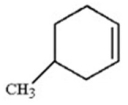
A)5-methylcyclohexene
B)4-methylcyclohexene
C)1-methyl-3-cyclohexene
D)1-methyl-4-cyclohexene
E)methylcyclohexene

A)5-methylcyclohexene
B)4-methylcyclohexene
C)1-methyl-3-cyclohexene
D)1-methyl-4-cyclohexene
E)methylcyclohexene

Unlock Deck
Unlock for access to all 84 flashcards in this deck.
Unlock Deck
k this deck
17
What is the molecular formula of the hydrocarbon that contains 5 carbon atoms,one ring,and one π bond?

Unlock Deck
Unlock for access to all 84 flashcards in this deck.
Unlock Deck
k this deck
18
Name the structure. 
A)2-methyl-2,4-pentadiene
B)4-methyl-1,4-pentadiene
C)2-methylene-4-pentene
D)4-methylene-2-pentene
E)2-methyl-1,4-pentadiene

A)2-methyl-2,4-pentadiene
B)4-methyl-1,4-pentadiene
C)2-methylene-4-pentene
D)4-methylene-2-pentene
E)2-methyl-1,4-pentadiene

Unlock Deck
Unlock for access to all 84 flashcards in this deck.
Unlock Deck
k this deck
19
A hydrocarbon with molecular formula C20H34 has what degree of substitution?
A)2
B)3
C)4
D)5
E)6
A)2
B)3
C)4
D)5
E)6

Unlock Deck
Unlock for access to all 84 flashcards in this deck.
Unlock Deck
k this deck
20
Name the structure. H2C  CHCH2I
CHCH2I
A)vinyl iodide
B)allyl iodide
C)1-iodo-2-propene
D)iodomethylethene
E)2-iodo-1-propene
 CHCH2I
CHCH2IA)vinyl iodide
B)allyl iodide
C)1-iodo-2-propene
D)iodomethylethene
E)2-iodo-1-propene

Unlock Deck
Unlock for access to all 84 flashcards in this deck.
Unlock Deck
k this deck
21
Provide the IUPAC name for the alkene shown below. 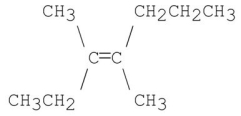


Unlock Deck
Unlock for access to all 84 flashcards in this deck.
Unlock Deck
k this deck
22
Name the structure. 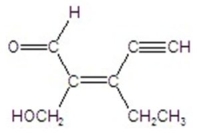
A)(Z)-3-ethyl-2-hydroxymethyl-2-penten-4-ynal
B)(E)-3-ethyl-2-hydroxymethyl-2-penten-4-ynal
C)(Z)-3-ethyl-5-hydroxymethyl-3-penten-1-ynal
D)(E)-3-ethyl-5-hydroxymethyl-3-penten-1-ynal
E)3-ethyl-5-hydroxymethyl-3-penten-1-ynal

A)(Z)-3-ethyl-2-hydroxymethyl-2-penten-4-ynal
B)(E)-3-ethyl-2-hydroxymethyl-2-penten-4-ynal
C)(Z)-3-ethyl-5-hydroxymethyl-3-penten-1-ynal
D)(E)-3-ethyl-5-hydroxymethyl-3-penten-1-ynal
E)3-ethyl-5-hydroxymethyl-3-penten-1-ynal

Unlock Deck
Unlock for access to all 84 flashcards in this deck.
Unlock Deck
k this deck
23
Provide the proper IUPAC name for the alkene shown below. 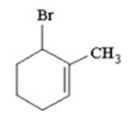


Unlock Deck
Unlock for access to all 84 flashcards in this deck.
Unlock Deck
k this deck
24
Name the structure. 
A)cis-4,5-dimethyl-4-hepten-1-ol
B)trans-3,4-dimethyl-3-hepten-7-ol
C)cis-3,4-dimethyl-3-hepten-7-ol
D)trans-4,5-dimethyl-4-hepten-1-ol
E)trans-4,5-dimethyl-4-heptenol

A)cis-4,5-dimethyl-4-hepten-1-ol
B)trans-3,4-dimethyl-3-hepten-7-ol
C)cis-3,4-dimethyl-3-hepten-7-ol
D)trans-4,5-dimethyl-4-hepten-1-ol
E)trans-4,5-dimethyl-4-heptenol

Unlock Deck
Unlock for access to all 84 flashcards in this deck.
Unlock Deck
k this deck
25
Which of the following is an allylic alcohol?
A)CH2 CHCH2OCH3
CHCH2OCH3
B)CH2 CHCH2CH3
CHCH2CH3
C)HOCH CHCH2CH3
CHCH2CH3
D)CH3CH CHCH2OH
CHCH2OH
E)CH2 CHCH2CH2OH
CHCH2CH2OH
A)CH2
 CHCH2OCH3
CHCH2OCH3B)CH2
 CHCH2CH3
CHCH2CH3C)HOCH
 CHCH2CH3
CHCH2CH3D)CH3CH
 CHCH2OH
CHCH2OHE)CH2
 CHCH2CH2OH
CHCH2CH2OH
Unlock Deck
Unlock for access to all 84 flashcards in this deck.
Unlock Deck
k this deck
26
Provide the systematic name of the compound shown below.Make sure to include the E or Z designator if necessary. 


Unlock Deck
Unlock for access to all 84 flashcards in this deck.
Unlock Deck
k this deck
27
Name the structure. 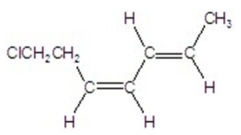
A)(2E,4E)-7-chloro-2,4-heptadiene
B)(2Z,4E)-7-chloro-2,4-heptadiene
C)(2Z,4Z)-7-chloro-2,4-heptadiene
D)(2E,4Z)-7-chloro-2,4-heptadiene
E)7-chloro-2,4-heptadiene

A)(2E,4E)-7-chloro-2,4-heptadiene
B)(2Z,4E)-7-chloro-2,4-heptadiene
C)(2Z,4Z)-7-chloro-2,4-heptadiene
D)(2E,4Z)-7-chloro-2,4-heptadiene
E)7-chloro-2,4-heptadiene

Unlock Deck
Unlock for access to all 84 flashcards in this deck.
Unlock Deck
k this deck
28
Draw the structure of propyl vinyl ether.

Unlock Deck
Unlock for access to all 84 flashcards in this deck.
Unlock Deck
k this deck
29
Which of the following statements about ethene,C2H4,is incorrect?
A)The H-C-H bond angles are approximately 109.5°.
B)All of the hydrogen atoms are in the same plane.
C)There is a total of five sigma bonds.
D)The carbon atoms are sp2 hybridized.
E)The H-C-H bond angles are approximately 120°.
A)The H-C-H bond angles are approximately 109.5°.
B)All of the hydrogen atoms are in the same plane.
C)There is a total of five sigma bonds.
D)The carbon atoms are sp2 hybridized.
E)The H-C-H bond angles are approximately 120°.

Unlock Deck
Unlock for access to all 84 flashcards in this deck.
Unlock Deck
k this deck
30
Draw the structure of (Z)-1-chloro-2-methyl-2-butene.

Unlock Deck
Unlock for access to all 84 flashcards in this deck.
Unlock Deck
k this deck
31
Provide the systematic name of the alkene below. 


Unlock Deck
Unlock for access to all 84 flashcards in this deck.
Unlock Deck
k this deck
32
Provide the systematic name of the compound shown below.Make sure to include the E or Z designator if necessary. 


Unlock Deck
Unlock for access to all 84 flashcards in this deck.
Unlock Deck
k this deck
33
Draw and name the six alkenes which have the molecular formula C5H10.

Unlock Deck
Unlock for access to all 84 flashcards in this deck.
Unlock Deck
k this deck
34
Give the hybridization,shape,and bond angle for a carbon in ethene.

Unlock Deck
Unlock for access to all 84 flashcards in this deck.
Unlock Deck
k this deck
35
How many carbons are in the planar double-bond system of 3-methylcyclopentene?
A)0
B)1
C)2
D)3
E)4
A)0
B)1
C)2
D)3
E)4

Unlock Deck
Unlock for access to all 84 flashcards in this deck.
Unlock Deck
k this deck
36
Which of the following statements about propene,CH3CH  CH2,is correct?
CH2,is correct?
A)All nine atoms lie in the same plane.
B)The compound has a cis and trans isomer.
C)It generally acts as a Lewis acid.
D)There is a total of eight sigma bonds.
E)All the carbon atoms are sp2 hybridized.
 CH2,is correct?
CH2,is correct?A)All nine atoms lie in the same plane.
B)The compound has a cis and trans isomer.
C)It generally acts as a Lewis acid.
D)There is a total of eight sigma bonds.
E)All the carbon atoms are sp2 hybridized.

Unlock Deck
Unlock for access to all 84 flashcards in this deck.
Unlock Deck
k this deck
37
Name the structure. 
A)(Z)-4,5-dimethyl-4-hepten-1-ol
B)(E)-4,5-dimethyl-4-hepten-1-ol
C)(E)-3,4-dimethyl-3-hepten-7-ol
D)(Z)-3,4-dimethyl-3-hepten-7-ol
E)(E)-4,5-dimethyl-4-heptenol

A)(Z)-4,5-dimethyl-4-hepten-1-ol
B)(E)-4,5-dimethyl-4-hepten-1-ol
C)(E)-3,4-dimethyl-3-hepten-7-ol
D)(Z)-3,4-dimethyl-3-hepten-7-ol
E)(E)-4,5-dimethyl-4-heptenol

Unlock Deck
Unlock for access to all 84 flashcards in this deck.
Unlock Deck
k this deck
38
Name the structure. 
A)cis-3-ethyl-4-hydroxymethyl-hex-3-en-1-yne
B)cis-2,3-diethylpent-2-en-4-yn-1-ol
C)trans-2,3-diethylpent-2-en-4-yn-1-ol
D)cis-3,4-diethylpent-3-en-1-yn-5-ol
E)trans-3,4-diethylpent-3-en-1-yn-5-ol

A)cis-3-ethyl-4-hydroxymethyl-hex-3-en-1-yne
B)cis-2,3-diethylpent-2-en-4-yn-1-ol
C)trans-2,3-diethylpent-2-en-4-yn-1-ol
D)cis-3,4-diethylpent-3-en-1-yn-5-ol
E)trans-3,4-diethylpent-3-en-1-yn-5-ol

Unlock Deck
Unlock for access to all 84 flashcards in this deck.
Unlock Deck
k this deck
39
Draw (E)-2-methyl-3-hexen-1-ol.

Unlock Deck
Unlock for access to all 84 flashcards in this deck.
Unlock Deck
k this deck
40
Provide an acceptable name of the compound below. 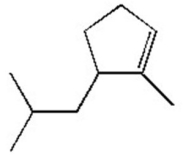


Unlock Deck
Unlock for access to all 84 flashcards in this deck.
Unlock Deck
k this deck
41
Draw the curved arrows to show how CH3CH=CHCH3 reacts with HBr to form a carbocation.

Unlock Deck
Unlock for access to all 84 flashcards in this deck.
Unlock Deck
k this deck
42
Draw all the possible constitutional isomers of C4H8.

Unlock Deck
Unlock for access to all 84 flashcards in this deck.
Unlock Deck
k this deck
43
What is the activation energy for the reaction B → A in the following diagram? 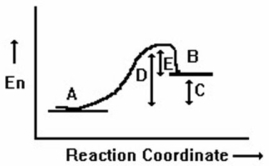
A)A
B)B
C)C
D)D
E)E

A)A
B)B
C)C
D)D
E)E

Unlock Deck
Unlock for access to all 84 flashcards in this deck.
Unlock Deck
k this deck
44
Calculate the enthalpy for the following reaction. 
 H-Cl,103 kcal/mole
H-Cl,103 kcal/mole
CH3CH2-H,101 kcal/mole
CH3CH2-Cl,85 kcal/mole

 H-Cl,103 kcal/mole
H-Cl,103 kcal/moleCH3CH2-H,101 kcal/mole
CH3CH2-Cl,85 kcal/mole

Unlock Deck
Unlock for access to all 84 flashcards in this deck.
Unlock Deck
k this deck
45
An increase in which of the following will occur if the reaction temperature is increased? I.Energy of activation
II)Collision frequency
III)Fraction of collisions with sufficient energy
A)I and II
B)I and III
C)II and III
D)I,II,and III
E)I
II)Collision frequency
III)Fraction of collisions with sufficient energy
A)I and II
B)I and III
C)II and III
D)I,II,and III
E)I

Unlock Deck
Unlock for access to all 84 flashcards in this deck.
Unlock Deck
k this deck
46
How many transition states are present in the following reaction diagram? 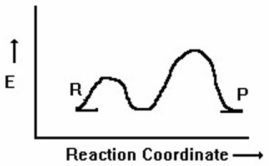
A)3
B)4
C)5
D)2
E)1

A)3
B)4
C)5
D)2
E)1

Unlock Deck
Unlock for access to all 84 flashcards in this deck.
Unlock Deck
k this deck
47
Which of the following is capable of exhibiting cis-trans isomerism?
A)1-butene
B)1-pentene
C)cyclohexene
D)ethene
E)2-butene
A)1-butene
B)1-pentene
C)cyclohexene
D)ethene
E)2-butene

Unlock Deck
Unlock for access to all 84 flashcards in this deck.
Unlock Deck
k this deck
48
Which of the following best describes the geometry about the carbon-carbon double bond in the alkene below? 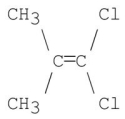
A)E
B)Z
C)neither E nor Z

A)E
B)Z
C)neither E nor Z

Unlock Deck
Unlock for access to all 84 flashcards in this deck.
Unlock Deck
k this deck
49
Which of the following is not an electrophile?
A)(H+)
B)(BF3)
C)(+NO2)
D)(Fe+3)
E)(CH2 CH2)
CH2)
A)(H+)
B)(BF3)
C)(+NO2)
D)(Fe+3)
E)(CH2
 CH2)
CH2)
Unlock Deck
Unlock for access to all 84 flashcards in this deck.
Unlock Deck
k this deck
50
Draw the structure of two alkenes with molecular formula C4H8 that do not exhibit cis-trans isomerism.

Unlock Deck
Unlock for access to all 84 flashcards in this deck.
Unlock Deck
k this deck
51
Which of the following is not a nucleophile?
A)FeBr3
B)Br-
C)NH3
D)
E)CH3OCH3
A)FeBr3
B)Br-
C)NH3
D)

E)CH3OCH3

Unlock Deck
Unlock for access to all 84 flashcards in this deck.
Unlock Deck
k this deck
52
Draw the structure of (Z)-4-ethyl-3-methylheptene.

Unlock Deck
Unlock for access to all 84 flashcards in this deck.
Unlock Deck
k this deck
53
Draw the structure of (Z)-4-ethyl-3,6-dimethyl-3-heptene.

Unlock Deck
Unlock for access to all 84 flashcards in this deck.
Unlock Deck
k this deck
54
An increase in which of the following results in a decrease in the rate of the chemical reaction?
A)temperature
B)concentration
C)collision frequency
D)energy of activation
E)fraction of collisions with proper orientation
A)temperature
B)concentration
C)collision frequency
D)energy of activation
E)fraction of collisions with proper orientation

Unlock Deck
Unlock for access to all 84 flashcards in this deck.
Unlock Deck
k this deck
55
Assign the E or Z configurational label to the following molecule: 


Unlock Deck
Unlock for access to all 84 flashcards in this deck.
Unlock Deck
k this deck
56
Which of the following contributes to make ΔG° more negative?
A)use of a catalyst
B)a more positive ΔH°
C)a more positive ΔS°
D)a larger rate constant
E)none of the above
A)use of a catalyst
B)a more positive ΔH°
C)a more positive ΔS°
D)a larger rate constant
E)none of the above

Unlock Deck
Unlock for access to all 84 flashcards in this deck.
Unlock Deck
k this deck
57
Identify the nucleophiles and electrophiles.
-OH,BH3,H2O,+CH3,NH3,Br-
-OH,BH3,H2O,+CH3,NH3,Br-

Unlock Deck
Unlock for access to all 84 flashcards in this deck.
Unlock Deck
k this deck
58
What is the value of ΔH in kcal/mole for the reaction shown? (CH3)3C-H + Cl-Cl → (CH3)3C-Cl + H-Cl
Bond energies are: (CH3)3C-H = 91 kcal/mole
(CH3)3C-Cl = 78.5 kcal/mole
Cl-Cl = 58 kcal/mole
H-Cl = 103 kcal/mole
A)+32.5
B)-57.5
C)-32.5
D)+57.5
E)-8.5
Bond energies are: (CH3)3C-H = 91 kcal/mole
(CH3)3C-Cl = 78.5 kcal/mole
Cl-Cl = 58 kcal/mole
H-Cl = 103 kcal/mole
A)+32.5
B)-57.5
C)-32.5
D)+57.5
E)-8.5

Unlock Deck
Unlock for access to all 84 flashcards in this deck.
Unlock Deck
k this deck
59
Give the mechanism for the following reaction. 


Unlock Deck
Unlock for access to all 84 flashcards in this deck.
Unlock Deck
k this deck
60
Which of the following correctly describes intermediates and/or transition states?
A)Transition states occur at minima on reaction coordinate diagrams.
B)Both transition states and intermediates occur at maxima on reaction coordinate diagrams.
C)An intermediate is always produced after the rate-determining step of a reaction mechanism.
D)Transition states have partially formed bonds whereas intermediates have fully formed bonds.
E)none of the above
A)Transition states occur at minima on reaction coordinate diagrams.
B)Both transition states and intermediates occur at maxima on reaction coordinate diagrams.
C)An intermediate is always produced after the rate-determining step of a reaction mechanism.
D)Transition states have partially formed bonds whereas intermediates have fully formed bonds.
E)none of the above

Unlock Deck
Unlock for access to all 84 flashcards in this deck.
Unlock Deck
k this deck
61
Provide the proper IUPAC name of the following compound 


Unlock Deck
Unlock for access to all 84 flashcards in this deck.
Unlock Deck
k this deck
62
Consider the single step interconversion of A and B shown below.How is the equilibrium constant K related to the rate constants k1 and k -1 and to the amounts of A and B present at equilibrium? 


Unlock Deck
Unlock for access to all 84 flashcards in this deck.
Unlock Deck
k this deck
63
Under what conditions is ΔG° equal to ΔH° for a chemical reaction?

Unlock Deck
Unlock for access to all 84 flashcards in this deck.
Unlock Deck
k this deck
64
How many degrees of unsaturation are present in a molecule with formula C10H16?
A)1
B)2
C)3
D)4
E)5
A)1
B)2
C)3
D)4
E)5

Unlock Deck
Unlock for access to all 84 flashcards in this deck.
Unlock Deck
k this deck
65
Consider the reaction coordinate diagram shown.Which step has the greatest rate constant in the forward direction? 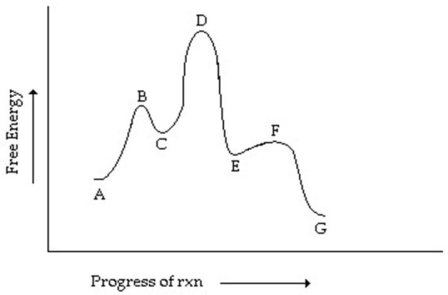


Unlock Deck
Unlock for access to all 84 flashcards in this deck.
Unlock Deck
k this deck
66
Consider the reaction coordinate diagram shown.What is the rate-determining step in the conversion of A to G? 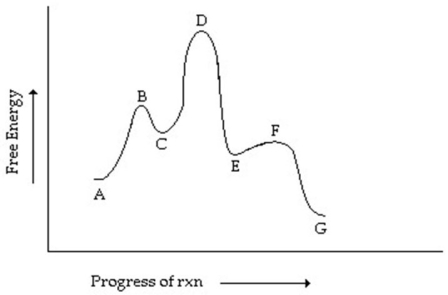


Unlock Deck
Unlock for access to all 84 flashcards in this deck.
Unlock Deck
k this deck
67
Which of the following correctly describes the reaction shown? 
A)ΔH° >0 and ΔS° >0
B)ΔH° >0 and ΔS <0
C)ΔH° <0 and ΔS >0
D)ΔH° <0 and ΔS <0
E)ΔH° = ΔS = 0

A)ΔH° >0 and ΔS° >0
B)ΔH° >0 and ΔS <0
C)ΔH° <0 and ΔS >0
D)ΔH° <0 and ΔS <0
E)ΔH° = ΔS = 0

Unlock Deck
Unlock for access to all 84 flashcards in this deck.
Unlock Deck
k this deck
68
Why do reactions tend to proceed at a faster rate as T increases?

Unlock Deck
Unlock for access to all 84 flashcards in this deck.
Unlock Deck
k this deck
69
Given an activation energy of 15 kcal/mol,use the Arrhenius equation to estimate how much faster the reaction will occur if the temperature is increased from 100°C to 120°C.R = 1.987 cal/mol ∙ K.

Unlock Deck
Unlock for access to all 84 flashcards in this deck.
Unlock Deck
k this deck
70
How many degrees of unsaturation are present in this molecule? 
A)1
B)2
C)3
D)4
E)5

A)1
B)2
C)3
D)4
E)5

Unlock Deck
Unlock for access to all 84 flashcards in this deck.
Unlock Deck
k this deck
71
The ΔG° for the conversion of "axial" isopropylcyclohexane to "equatorial" isopropylcyclohexane at 298K is -2.1 kcal/mol.Calculate the percentage of isopropylcyclohexane molecules that have the isopropyl substituent in the axial position at this temperature.
[R = 1.987 × 10-3 kcal mol-1K-1]
[R = 1.987 × 10-3 kcal mol-1K-1]

Unlock Deck
Unlock for access to all 84 flashcards in this deck.
Unlock Deck
k this deck
72
Which of the following correctly describes the reaction whose reaction coordinate diagram is shown? 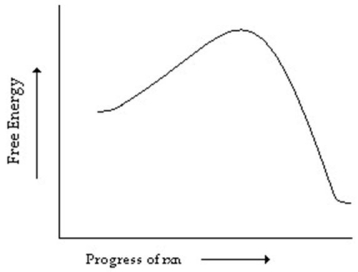
A)endergonic with no transition state
B)exergonic with no transition state
C)endergonic with a transition state
D)exergonic with a transition state
E)endergonic with an intermediate

A)endergonic with no transition state
B)exergonic with no transition state
C)endergonic with a transition state
D)exergonic with a transition state
E)endergonic with an intermediate

Unlock Deck
Unlock for access to all 84 flashcards in this deck.
Unlock Deck
k this deck
73
Consider the reaction coordinate diagram shown.Which step has the greatest activation energy? 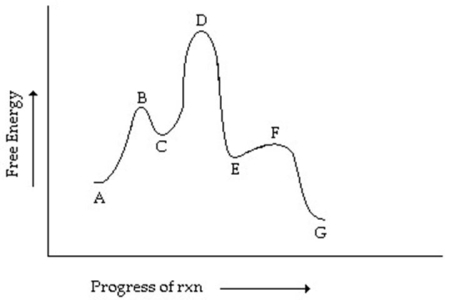
A)A going to C
B)C going to E
C)E going to G
D)E going to C
E)C going to A

A)A going to C
B)C going to E
C)E going to G
D)E going to C
E)C going to A

Unlock Deck
Unlock for access to all 84 flashcards in this deck.
Unlock Deck
k this deck
74
Consider the one-step conversion of F to G.Given that the reaction is endergonic by 5 kcal/mol and that the energy difference between G and the transition state for the process is 15 kcal/mol,sketch a reaction-energy profile for this reaction.Make sure to show how the given energy differences are consistent with your sketch.

Unlock Deck
Unlock for access to all 84 flashcards in this deck.
Unlock Deck
k this deck
75
Based on the following energy diagram,which compound,A or C,is formed faster from B? Which is more stable,A or C? Explain. 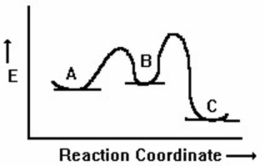


Unlock Deck
Unlock for access to all 84 flashcards in this deck.
Unlock Deck
k this deck
76
Linalool is a major compound present in the essential oil of coriander.How many degrees of unsaturation are present in this molecule? 
A)2
B)3
C)4
D)5
E)6

A)2
B)3
C)4
D)5
E)6

Unlock Deck
Unlock for access to all 84 flashcards in this deck.
Unlock Deck
k this deck
77
The Arrhenius equation models how the rate constant k
A)increases as both Ea and T increase.
B)increases most when Ea increases and T decreases.
C)increases most when Ea decreases and T increases.
D)increases as both Ea and T decrease.
E)increases as reactant concentrations increase.
A)increases as both Ea and T increase.
B)increases most when Ea increases and T decreases.
C)increases most when Ea decreases and T increases.
D)increases as both Ea and T decrease.
E)increases as reactant concentrations increase.

Unlock Deck
Unlock for access to all 84 flashcards in this deck.
Unlock Deck
k this deck
78
Consider the conversion of C to D via a one-step mechanism.The activation energy of this conversion is 3 kcal/mol.The energy difference between D and the transition state of the reaction is 7 kcal/mol.Estimate ΔH° for the reaction C → D.

Unlock Deck
Unlock for access to all 84 flashcards in this deck.
Unlock Deck
k this deck
79
Consider the reaction coordinate diagram shown.Which letters designate intermediates? 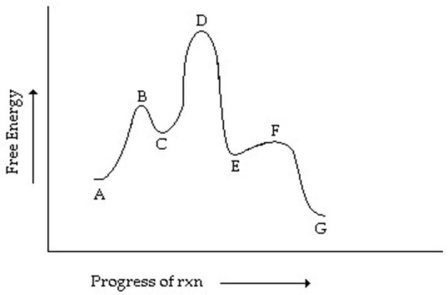


Unlock Deck
Unlock for access to all 84 flashcards in this deck.
Unlock Deck
k this deck
80
What is the free energy of activation of a one-step reaction? How is it qualitatively related to the rate constant of the reaction?

Unlock Deck
Unlock for access to all 84 flashcards in this deck.
Unlock Deck
k this deck


